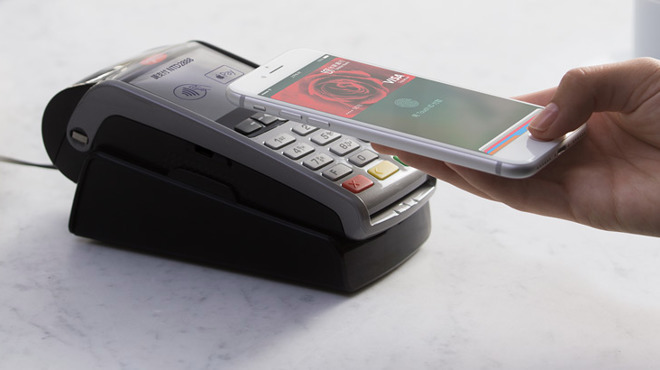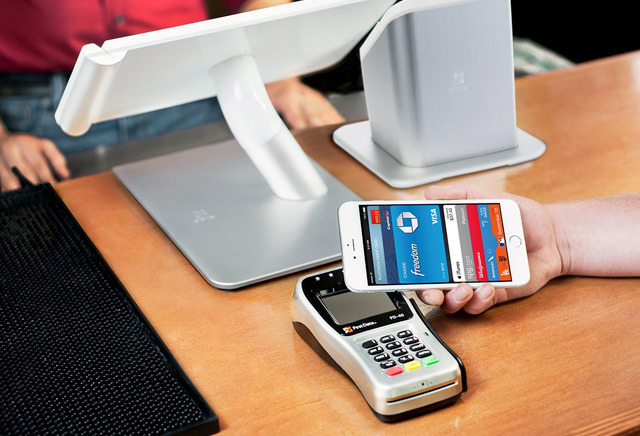This year could prove to be pivotal for Apple Pay in a number of ways, including adoption and merchant availability, but also in support from card issuers, many of which have contracts with Apple up for renewal.
Apple is set to negotiate extensions of three-year deals with credit card companies and banks, according to The Wall Street Journal.
The report features quotes from Apple services chief Eddy Cue, who expressed confidence that financial institutions will re-up with Apple Pay due to continued growth of the contactless payment method.
The report attempts to portray adoption of Apple Pay as "disappointing," though comments from Cue suggest the company is in no rush, as long as adoption remains steady.
"Does it matter if we get there in two years, three years (or) five years?" he asked. "Ultimately, no."
It's estimated that just 13 percent of iPhone users have tried Apple Pay, with barriers ranging from merchant availability to user reluctance with new technology. Still, research also suggests users are twice as likely to have tried Apple Pay as opposed to rivals like Samsung Pay or Android Pay.
The Journal also cited David Robertson of Nilson Report, who believes that a tipping point for Apple Pay could be imminent. Currently, it's estimated that about one third of U.S. retailers support the NFC-based payment service.
Apple has been steadily adding new institutions to Apple Pay since its debut in late 2014, including more than 20 banks this week alone. International expansion has also progressed, with its debut in Taiwan last week, and arrival in Italy expected soon.
Major U.S. banks are also coming around to Apple Pay support for ATM withdrawals, as Wells Fargo revealed last week that it will add support later this year, joining Bank of America's "select" compatible ATMs.
Statistics released in February indicated that 36 percent of U.S. merchants accept Apple Pay, making it the most common mobile payment platform. The data from Boston Retail Partners suggests adoption was up considerably from just 16 percent of retailers a year prior. Android Pay came in at 24 percent, and Samsung Pay at 18 percent, though the latter can be used at businesses that don't officially support the platform.
In the company's most recent quarterly earnings call, Apple indicated that Apple Pay transactions were up 500 percent year-over-year in the December quarter, driven by triple the number of users.
 Neil Hughes
Neil Hughes








-m.jpg)






 Christine McKee
Christine McKee
 Malcolm Owen
Malcolm Owen
 Marko Zivkovic
Marko Zivkovic

 Andrew Orr
Andrew Orr
 Andrew O'Hara
Andrew O'Hara
 William Gallagher
William Gallagher





-m.jpg)



22 Comments
Kind of depressing that some banks' three-year contracts are coming up already, yet my company's credit union still has not announced any plans of supporting it at all, ever.
I am finally seeing more businesses in my town and surrounding area not only accept ApplePay but (almost) understand how (and that) it works. Even so, there are iPhone users who haven't the faintest idea what it is. I was at a Red Robin and the wait staff, a younger person probably in her mid to late twenties, didn't know what ApplePay was even though she has an iPhone 6. Of course, Red Robin uses their POS self-service station at each table (at least in the bar--I have ice tea) which doesn't take ApplePay, but she sounded interested so I left the URL for ApplePay so she could investigate it. I see TV ads for ApplePay but Apple's advertising just isn't reaching a lot of people. Nobody else in my immediate family uses it and I don't believe they even use TouchID and they all have an iPhone 6 or iPhone 6S. They see me use it but just don't have the "time" to figure it out.
As for Wells Fargo's use of ApplePay at the ATM, they aren't using ApplePay because ApplePay isn't used for bank transactions only for paying for a purchase. This in itself shows that businesses don't really understand what ApplePay or TouchID really is. I would hope Wells Fargo and BofA actually discuss these things with Apple before dumping a stupid implementation onto customers.
It's a funny piece of myopia, when the author's personal anecdote is projected out as if it's the experience and reality for everyone. It's not, and that's evidenced by the utterly significant surge in ApplePay transactions over the last year. Certainly the USA is a slower adopter, but that is due to the weaker penetration of wireless payment terminals - a slowness that is unique to the USA.